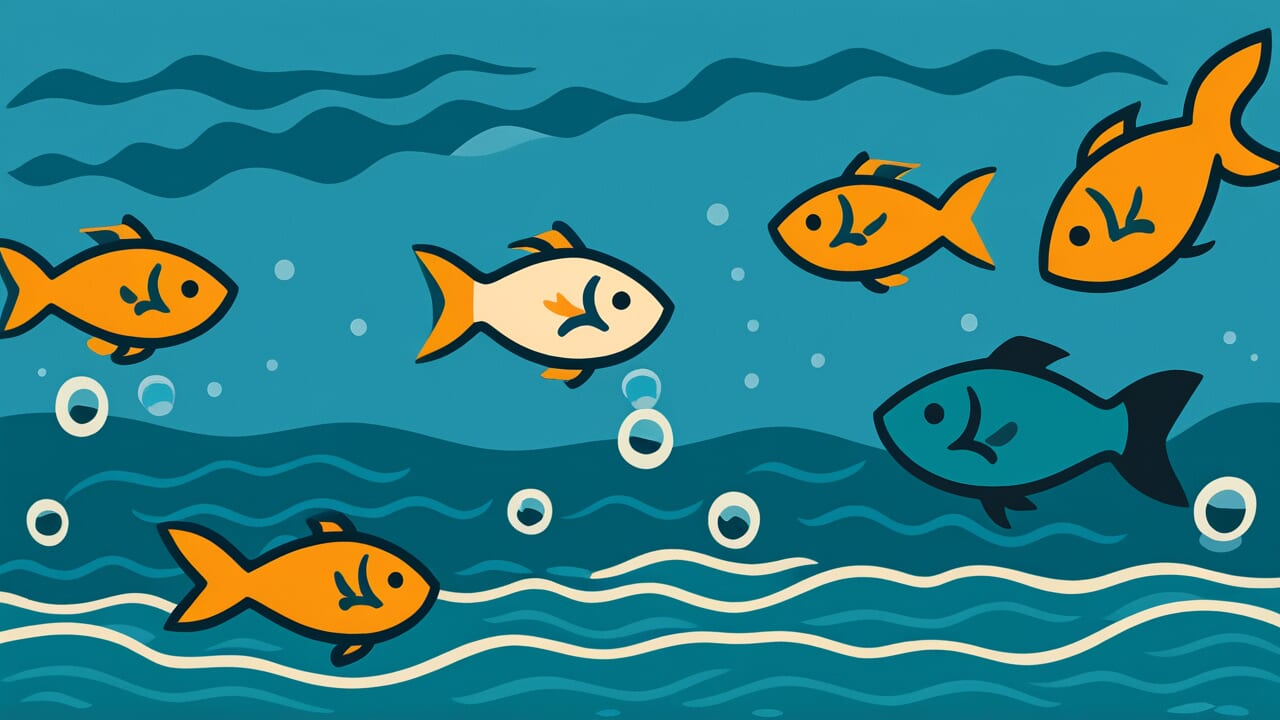How to Read “Fishes follow the bait”
Fishes follow the bait
FISH-iz FOL-oh the BAYT
All words use common pronunciation.
Meaning of “Fishes follow the bait”
Simply put, this proverb means people naturally go after things that seem to benefit them personally.
The saying compares humans to fish in water. When a fisherman drops bait into a lake, fish swim toward it because it looks like food. They want the reward, so they follow it. People act the same way when they see something that might help them get ahead.
We use this wisdom to explain why people make certain choices. Someone might take a job because of high pay, even if the work seems boring. Students might choose easy classes to boost their grades. Friends might suddenly become interested when you mention having concert tickets. The “bait” could be money, status, fun, or any other advantage.
What makes this observation interesting is how predictable it can be. Once you understand what someone values most, you can often guess their next move. The proverb doesn’t judge whether following benefits is good or bad. It simply points out that this behavior is as natural as fish swimming toward food.
Origin and Etymology
The exact origin of this proverb is unknown, though it appears in various forms across different languages and time periods. The comparison between human behavior and fish responding to bait reflects observations that people have made for centuries.
Fishing has been essential for human survival throughout history. Ancient communities that lived near water would have watched fish behavior daily. They noticed how reliably fish moved toward anything that looked like food. This made fishing possible, but it also provided a perfect comparison for human nature.
The saying likely developed as people recognized the same pattern in their communities. Leaders could attract followers with promises of rewards. Merchants could draw customers with appealing offers. The fishing metaphor made this complex social observation easy to remember and share. Over time, the proverb spread through oral tradition and eventually appeared in written collections of folk wisdom.
Interesting Facts
The word “bait” comes from Old Norse “beita,” meaning “to cause to bite.” This connects directly to the fishing origins of the metaphor.
Many languages have similar proverbs comparing human attraction to rewards with fish following bait, suggesting this observation developed independently in different cultures.
Usage Examples
- Marketing manager to intern: “We’ll offer a free trial to get customers interested – fishes follow the bait.”
- Mother to daughter: “He’s only being nice because he wants something from you – fishes follow the bait.”
Universal Wisdom
This proverb reveals a fundamental truth about motivation that has shaped human behavior since our earliest communities formed. The drive to seek personal advantage isn’t a character flaw or modern development. It represents a survival mechanism that helped our ancestors stay alive and thrive in challenging environments.
The comparison to fish following bait highlights how automatic this response can be. Just as fish don’t consciously decide to investigate potential food, humans often move toward opportunities without deep analysis. This instinctive attraction to benefit served our species well when resources were scarce and competition was fierce. Those who could quickly identify and pursue advantages were more likely to survive and provide for their families.
Yet this same drive creates ongoing tensions in human relationships and societies. The pursuit of personal benefit can conflict with group harmony, fairness, and long-term thinking. People following their own “bait” might ignore consequences for others or make choices that seem shortsighted. The proverb captures this double-edged nature of human motivation. It acknowledges that seeking advantage is natural and predictable, while also suggesting the need for awareness about how this drive influences behavior. Understanding this pattern helps explain why certain appeals work so effectively and why people sometimes act in ways that surprise or disappoint others.
When AI Hears This
The smartest people often fall for the simplest tricks. They see an opportunity and calculate the benefits perfectly. Their logic works flawlessly, but someone else designed the entire game. The bait isn’t random—it targets exactly how rational minds think.
This creates a strange hunting ground in human society. The most logical people become the easiest prey. They follow clear patterns when making decisions about money, status, or success. Smart people trust their ability to spot good deals. This confidence becomes their blind spot.
What fascinates me is how this makes perfect sense. Being attracted to advantage helped humans survive for thousands of years. The same instinct that found food and safety now finds investment schemes. Evolution couldn’t predict that others would study these patterns so carefully. Human logic remains beautifully consistent, even when consistency becomes dangerous.
Lessons for Today
Understanding that people follow what benefits them most creates opportunities for better relationships and clearer thinking. This insight works in both directions. You can recognize when others are responding to incentives, and you can examine your own motivations more honestly.
In personal relationships, this wisdom helps set realistic expectations. When someone suddenly shows interest in your plans, consider what advantage they might see. This doesn’t mean becoming suspicious of everyone, but rather understanding that mixed motives are normal. Similarly, when you feel drawn to certain opportunities, pause to identify what specific benefit attracts you. Sometimes the “bait” is obvious like money or status. Other times it might be emotional rewards like feeling important or avoiding difficult conversations.
The challenge lies in balancing self-interest with other values. Following beneficial opportunities isn’t wrong, but it becomes problematic when it’s the only factor in decision-making. Communities function best when people can pursue personal advantages while also considering broader impacts. This might mean choosing slightly less beneficial options that align with your principles, or finding ways to create mutual benefits rather than zero-sum competitions. The goal isn’t to stop following worthwhile opportunities, but to follow them more thoughtfully and with awareness of the full picture.



Comments